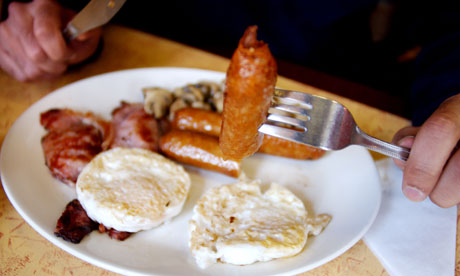
Thirty years ago, Michael Foley had an epiphany. As he emerged from jury service, the street outside the court became "illuminated, transfigured, a portal to infinite being". From his account it sounds as though he was at Highbury Corner, or, please God no, Wood Green Shopping City.
Everything became sublime, especially the menu of the caff advertising "egg's, sausage's and tomato's". "Those misplaced apostrophes tore at my heart like orphan children, blessed like the first timid snowdrops of February, sparkled like a dusting of precious stones. I wanted to rush in and embrace the illiterate proprietor. To die of a heart attack from one of his fry-ups would surely be the ideal way to go to Heaven."
Thankfully he didn't, otherwise we wouldn't have this lovely book. Instead, he wandered up the street to an estate agent's office, inside which a middle-aged woman in a heavy cardigan was snuffling into a tissue and leaning over a two-bar fire, exposing the white roots at the parting of her dyed hair. "I wanted to go in, tell her that I understood her disappointments and difficulties and then help pay to have her roots done by renting a one-bedroom flat above a launderette."
Where did the epiphany come from? Freed from job and family for a few wastrel days of coffee drinking, novel reading and justice dispensing, Foley could see grey quotidian as parti-coloured pageant, much as Joyce needed to get to Trieste to savour Dublin, or Proust needed to hole up in a darkened, cork-lined room to nail the Parisian beau monde.
In recession-chastened, soddenly staycationing Britain, Foley may well have devised a new bestseller format: a how-to book offering a way of escape without leaving prison. It's like a highbrow version of the "Keep Calm and Carry on" franchise. It's also a book for readers of a certain age. He confesses: "I have felt disappointed, disillusioned and trapped, caught up in obligation and weighed down by burdens, rapidly running out of time, hope, opportunity and energy. Consumed by regrets, resentfully blaming others for everything, I too have yearned to go back, begin again and do everything differently, with the principal difference, of course, being more frequent, varied and exciting sex."
A jejune error: the past is unrepeatable, regret futile. "The crucial thing is to start paying attention now." Like a budget Buddha, Foley counsels mindfulness, attending to the here and now rather than dreaming of the future or fetishising the past. That way we can sacralise the profane, even empathise with estate agents with tragic hairdos. Or, as Foley puts it, "by the sweaters of Benetton I sat down and wept".
But how do we reach the portal to infinite being without the lottery of jury service? How elude the hellish maw opened up by break-out areas, corporate away-days and co-workers with signs on their desks reading "Situation worsening – please send chocolate!"?
Foley recommends spiritual exercises, appropriating the French theorist Michel de Certeau who, in The Practice of Everyday Life, railed against those snobby morons who fail to realise that if the everyday is everything that is ignored by official forms of knowledge, its very invisibility gives the potential for freedom and even subversion.
Certeau advocated the idea of the ruse, reconfiguring everyday tasks for transgressive personal purposes. One night, Foley relates, he did just this when he sneaked out to a neighbour's skip with an old ironing board. He "felt not only 30 years younger but as lean, tough, resourceful and clandestine as a Viet Cong tunnel rat".
I feel partly responsible for this book. Two years ago, reviewing its predecessor, The Age of Absurdity: Why Modern Life Makes It Hard to Be Happy, I ridiculed Foley for prescribing reading Marcel Proust and James Joyce to sacralise the everyday. Embracing the Ordinary reads like a retort to that abuse. He's unapologetic: "After reading Joyce, banal conversation is suddenly comical, fascinating and strange. After reading Proust, I realise that contemporary celebrities are the exact equivalent of his aristocrats." Kerry Katona as the Duchesse de Guermantes? Stop looking sceptical.
But Joyce and Proust, on whom Foley spends much time meditating in these pages, are not the only high priests of low life. He hails others: Alice Munro, Walker Evans, Edward Hopper, Georges Perec, David Foster Wallace, Jan Vermeer. He cites the advice of the poet Rainer Maria Rilke to a depressed man: "If your daily life seems poor do not blame it; blame yourself, tell yourself that you are not poet enough to call forth its riches."
If there's a problem with Foley's book, it's that it might be seen as an apologia for political quietism. Instead of re-enchanting the quotidian, shouldn't we be hanging with Mark Ruffalo at Occupy or going on the rob with antinomian pre-pubescents? Only if, Foley all but replies, you think Buddhism's critique of human desire and its recommendations of how to elude it are conservative.
Foley includes chapters on the poetry of everyday language, the allure of snobbery, the delights of bunking off and having sex with your spouse on a wet Tuesday afternoon, on the office (including a fine discussion of the pencil) and the home (a superb co-opting of Heidegger's eulogy to the jug). At the end Foley imagines a Centre for the Appreciation of Everyday Life with him as president, which sounds harrowingly Bottonian.
Ultimately, after all, re-enchanting the quotidian is a personal task. I've just hung out the washing, furtively sniffing a tea towel to access the sublime and then peeping through the fence at the woman shouting at her dog in the park, "Rebel! Don't shit there!" to cultivate empathy with humankind. It didn't work, but I'll keep trying.

